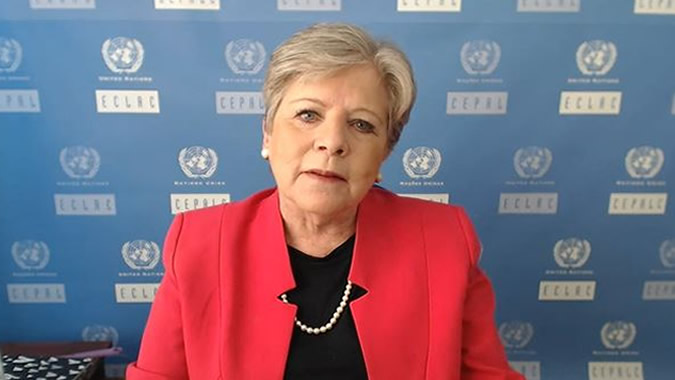Alicia Bárcena Urges for Strengthening Triangular Cooperation in the Region and Fostering its Role as a Catalyst of the Post-Pandemic Recovery
Work area(s)
ECLAC’s Executive Secretary participated in a regional conference organized by the Ministry of Foreign Affairs of Argentina and the Federal Ministry for Economic Cooperation and Development of Germany, focused on the prospects for triangular cooperation in Latin America and the Caribbean.

The Executive Secretary of the Economic Commission for Latin America and the Caribbean (ECLAC), Alicia Bárcena, urged today for strengthening triangular cooperation and fostering its role as a catalyst of the post COVID-19 recovery during a regional conference organized by Argentina’s Ministry of Foreign Affairs, International Trade and Worship and Germany’s Federal Ministry for Economic Cooperation and Development (BMZ).
The senior United Nations official was one of the main speakers at the V Regional Conference “Perspectives on Triangular Cooperation in Latin America and the Caribbean”, which was held virtually and was inaugurated by Volker Oel, the BMZ’s Deputy Director General for Latin America and the Caribbean, and María Belén Bogado, Director General of International Cooperation at the Argentine Foreign Ministry.
Tarik Iziraren, Deputy Director for Policy and Strategic Partnerships of the United Nations Office for South-South Cooperation (UNOSSC), participated as a special guest along with other high-ranking authorities.
During her presentation, Alicia Bárcena stressed that the post-pandemic recovery must be with resilient, inclusive and sustainable economies, bolstering the energy transition, digital connectivity and public electric mobility, regional integration, the strengthening of the care economy, and the revival of agro-ecology and agroforestry.
She added that the pandemic has intensified Latin America and the Caribbean’s structural problems, along with the urgency of changing the development model.
She warned that the -9.1% drop in the region’s GDP will result in the worst contraction in the last 100 years, adding that the crisis has been more intense than expected, it will last longer than envisioned, and it will require active fiscal and monetary policies for more time.
ECLAC’s Executive Secretary affirmed that the crisis revealed serious structural problems in the region, such as inequality, low productivity, and gaps in health and social protection.
She emphasized that the State has taken a leading role with fiscal efforts, even in contexts of fiscal deficit. However, she warned, national efforts will require greater international cooperation with access to financing under favorable conditions, which take into account the problems faced by middle-income countries and small island states.
“The recovery must be understood as something that will lead us to a different future, to build from here onward with a distinct model, with more equality and environmental sustainability, changing our productive and social model. The new paradigm for cooperation in the future must take into account these elements and the fact that inequality defines our region,” she expressed.
ECLAC’s top representative underlined that a more inclusive global compact is needed for the provision of public goods: universal health, climate security, peace and financial stability.
She noted that the international context is uncertain due to the weakening of multilateralism and the return of protectionism, the deterioration – and in some cases, abandonment – of a multilateral cooperation agenda on issues as relevant as climate change and financial stability. This is compounded by the “graduation” of middle-income countries with a high risk of exclusion from the international cooperation system, using GDP per capita as the sole criterion.
“All of this leads to many difficulties for mobilizing the financing needed to fulfill the Sustainable Development Goals (SDGs): between $5 and $14 trillion dollars annually. In the current context, with the weakening of multilateralism and structural challenges in Latin America and the Caribbean, we cannot give up on the 2030 Agenda. It offers us a road map and enables us to have new cooperation modalities,” ECLAC’s Executive Secretary stated.
In this scenario, she indicated, triangular cooperation becomes relevant to link the emergency with the medium term, with a focus on a public revenue-centered expansionary fiscal policy with sustainability and triangular cooperation projects aimed at expanding the sources of financing for development, with the goal of overcoming this crisis and making progress on the SDGs.
Furthermore, she underscored that, at a time of pandemic, triangular cooperation must ensure access to COVID-19 vaccines, while also working to strengthen less asymmetrical forms of cooperation, strengthening South-South cooperation and challenging the governance of the international system, and opening discussion on forms of aid to define new consensuses and actors.
She highlighted some examples of triangular cooperation promoted by ECLAC and the Federal Ministry for Economic Cooperation and Development (BMZ) with support from the German Agency for International Cooperation (GIZ) in areas such as mitigation of and adaptation to climate change, support for small and medium-sized enterprises, gender equality, industrial policies and decent work, among others.
Finally, Alicia Bárcena stressed that fueling the reactivation with financial stability requires mechanisms for triangular financial cooperation aimed at middle-income countries, which represent 96% of public external debt.
“If these countries slide into insolvency, there will be a systemic crisis. The initiative to suspend debt servicing must be extended to vulnerable middle-income countries, above all in Central America and the Caribbean, and an international mechanism for sovereign debt restructuring must be created to lessen the uncertainty and the risks of debt renegotiation processes,” she concluded.
Related content
Un nuevo paradigma para la cooperación de futuro en América Latina y el Caribe, una región de ingresos medios
Presentación de Alicia Bárcena, Secretaria Ejecutiva de la CEPAL.
Related link(s)
Country(ies)
- Latin America and the Caribbean
Contact
Public Information Unit
- prensa@cepal.org
- (56 2) 2210 2040